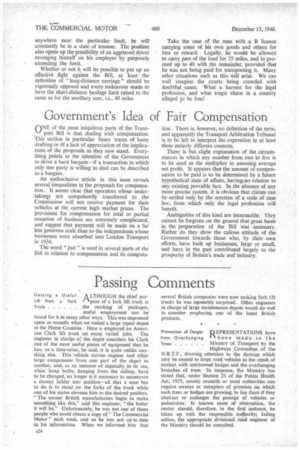Government's Idea of Fair Compensation
Page 26

If you've noticed an error in this article please click here to report it so we can fix it.
nNE of the most iniquitous parts of the Trans port Bill is that dealing with compensation. This section in particular bears traces of hasty drafting or Of a lack of appreciation of the implications of the proposals as they now stand. Everything points to the intention of the Government to drive a hard bargain—if a transaction in which only one party is willing to deal can be described as a bargain.
An authoritative article in this issue reveals several inequalities in the proposals for compensation. It seems clear that operators whose undertakings are compulsorily transferred to the Commission will not receive payment for their vehicles at the current high market prices. The provisions for compensation for total or partial cessation of business are extremely complicated. and suggest that payment will be made on a far less generous scale than to the independents whose businesses were absorbed into London Transport in 1934.
The word " just " is used in several parts of the Bill in relation to compensation and its computa tion. There is, however, no definition of the term, and apparently the Transport Arbitration Tribunal is to be left to interpret the expression in at least three entirely different contexts.
There is but slight explanation of the circumstances in which any number from two to five is to be used as the multiplier in assessing average net profit. It appears that the amount of compensation to be paid is to be determined by a future hypothetical state of affairs, having, no relation to any existing provable fact. In the absence of any more precise system, it is obvious that claims can be settled only by the erection of a code of case law, from which only the legal profession will benefit.
Ambiguities of this kind are inexcusable. They cannot be forgiven on the ground that great haste in the preparation of the Bill was necessary. Rather do they show the callous attitude of the Government towards those who, by their own efforts, have built up businesses, large or small, and have in the past contributed largely to the prosperity of Britain's trade and industry.












































































